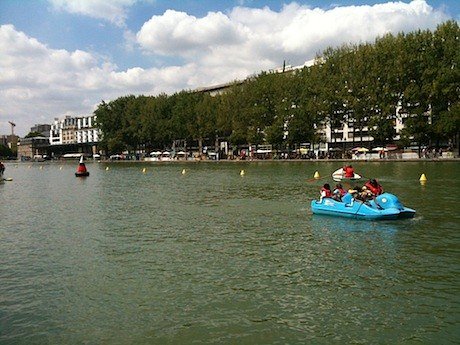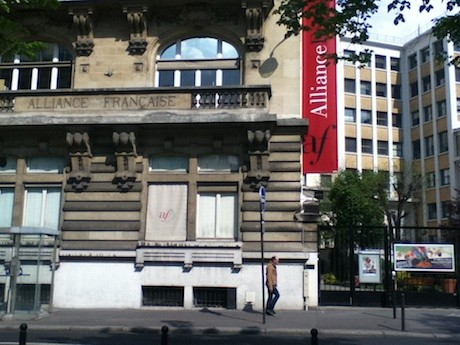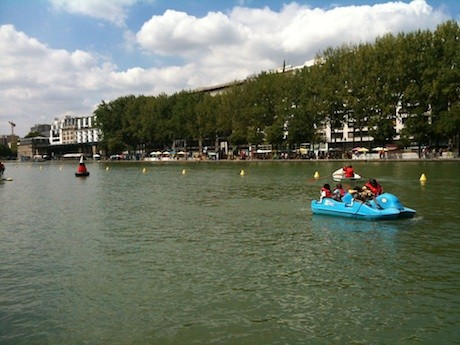Talk the Talk: Learning French in Paris

Tue 4 Dec 2012

Alliance Française.
Lessons to Jive with Your Schedule and Your Wallet
It’s well known and tested that we can survive in Paris without learning French, but where is the fun and romance in that? My first glimpse of Paris was a two-day breeze-through, squeezed in the middle of a longer trip of Germany. In Paris my family and I were met with only smiles when we butchered French basics and pleasantries, save one surly driver of those double-decker trip buses. And after a boiling day of driving a barge-like object through Paris traffic, can we really blame him for his temperament?
We all know that stereotype of the cranky, scary Parisian that we foreigners are programmed to fear. The question is: How do we avoid provoking the Parisians around us? As I’ve found in most countries, making the first cross-cultural step by at least attempting the local language can be a peace offering. My friend Paul, drawn to France by love for a beautiful French girl, had little grasp of the language but created a winning opening line: “Excusez-moi, j’ai un problème. Je ne parle pas français” (“Excuse me, I have a problem. I don’t speak French”). With the clerk’s sentiments usually won, my friend would then slowly proceed in English.
To go beyond these basic survival skills, Paris offers plenty of language schools that provide both short- and long-term curricula involving classroom study and cultural excursions, as well as social networks online for arranging face-to-face conversation practice and developing your French. While schools come with a cost, I have found the classroom structure and social atmosphere to be worth it, especially taking into account the interesting classmates that have become great companions of mine in Paris. If saving money is more appealing to you than grammar and structure, opt for arranging informal French conversation rendezvous via social websites.
Below is a selection of places and tips well worth your time, even during a brief stay in Paris. Bonne chance!
SCHOOLS
Alliance Française
This large school offers a variety of both intensive (20 hours per week) and extensive (9 hours or less) general courses, based on the textbooks Alter Ego for the levels from A1 to C2, like most schools, plus an option of specialized courses such as pronunciation, writing and thematic workshops, to be registered for individually. As at many language schools, each new student’s level is decided by an online placement exam.
Pros: Short-term or long-term; you can sign up for just one week of classes, or receive a discount for booking multiple weeks. The school’s impressive facilities include a cinema, a cafeteria, and numerous classrooms equipped with awe-inspiring Smart Boards. Take advantage of frequent afternoon trips, movies, wine tastings and cooking classes, many of them free or very inexpensive. The school’s location on the rue de Rennes makes for good shopping at small boutiques or large chains like H&M and Mango. The Alliance Française has other branches around France as well as abroad, giving it a worldwide network and excellent reputation.
Cons: My monthly tuition was equal to my monthly rent. Ouch!
Campus Langues
I’m a big fan of this little school. Wanting to experiment with a new program and maintain a more sustainable budget, I switched from the Alliance Française to Campus Langues. For half the hourly rate of my previous school, my schedule was a holistic blend of principal coursework each morning and an hour or two in the early afternoon, offering various lectures on French history and culture, linguistic workshops (essential topics such as pronunciation, essay writing, grammar and orthography) and dynamic trips around Paris given by amusing French professors.
Pros: The vibrant program offers a table of workshops and activities every week, allowing students to dabble in many linguistic fields for one all-inclusive price, without the hassle of registering for specialized courses individually. For general courses, intensive and extensive classes are offered, with an option to book for one week or multiple months. The professors are serious and knowledgeable in teaching yet equally concerned with making students laugh and enjoy their lessons. The charming location on the canal d’Ourcq is ideal for strolling the banks, eating outside, catching a movie and, in the summer, taking full advantage of the funfair that is Paris Plages. For a convenient gym, Piscine Mathis is just around the corner and offers fitness classes like yoga and Zumba, and a sizable swimming pool with long open hours.
Cons: Lesser-known school with smaller facilities (i.e., no cinema or cafeteria), but that simply encourages you and your classmates to set out for the cinema and cafés along the canal. Unlike the Alliance Française, professors of general courses do not rotate every month; however, taking the various afternoon workshops gives students plenty of exposure to various teaching styles and subjects.

The canal d’Ourcq, next to Campus Langues.
La Sorbonne
This world-famous university has the distinction and the intensity sought by the serious and ambitious students among us. Apart from its university courses for students working toward a degree, the Sorbonne’s Cours de Civilisation Française also functions as a language school much like the Alliance Française and Campus Langues, but on a more consuming semester-long schedule. With the typical course options of extensive or intensive, morning or afternoon, general courses or specialized, the Sorbonne stands apart for its notoriously demanding levels of homework. Remember, this is university level!
Pros: Worldwide recognition, high-quality education and the side perk of a snazzy addition to your CV. Venture from the general courses and browse the quirky modules with subjects like spoken and written expression, civilization lectures, French for tripism (diplomas awarded by the Paris Chamber of Commerce) and academic work methodology. Attend classes in the heart of Paris and become a part of an expansive university network.
Cons: More expensive than Campus Langues (but less than Alliance Française). Without the option to start and end courses whenever you like, pay careful attention to the application deadline and be prepared to commit to a schedule spanning the entire semester—with the exception of four-week summer courses. And don’t forget to clear up your schedule for the piles of homework!
Conversation Groups
Meetup’s Franglish Group
Among the many French-English language exchange groups found on the global website Meetup, Franglish must be singled out for its creative gatherings. Reminiscent of speed dating, the group assembles at bars and sorts itself into pairs, each couple chatting until they are signaled to switch, every 14 minutes. At each seven-minute interval, the language changes back and forth between English and French, and each member’s challenge is to play by those rules and develop their bilingual natures.
Pros: A fun yet structured way to practice French over a beer and meet other French lovers (no pun intended).
Cons: After multiple times, the short conversations may become repetitive, and your personal development may stagnate. Participants must pay 12 euros to help cover costs (8 euros for students), but it also buys you one drink.
Conversation Exchange
This brilliant website connects language enthusiasts all over the world, complete with member profiles much like Couch Surfing. While my friend selected a different French man for practically every night of the week for date-like outings of French and English language exchange, you can choose whatever partner, meeting place and time most appeal to you. Some member profiles state preferences such as a same-sex partner, suggest practicing over Skype or state exactly how serious (or playful) a rendezvous they are seeking. Most are studious twentysomethings. According to my friend, many were attractive young engineers and bankers. (Not that that matters, right?)
Pros: Personable, free and completely adaptable to your own schedule, and you can boost your French and meet interesting locals. This system is especially beneficial for shy students, as the couple dynamic forces them to speak. Profiles are without photos, so it avoids being a creepy dating site.
Cons: Overall, exchanges have little discipline, and one language, especially English, tends to dominate. Keep the exchange egalitarian and be insistent on practicing your French. What’s more, a party of two can produce awkward moments. If you don’t connect with your language partner, you may be frantically searching for a polite escape. Fortunately you can examine members’ profiles and get choosy about your partner. If you’re awkward-phobic, invite more than one partner for a (purely platonic) ménage à trois.
Related Links
Alliance Française
Campus Langues
Paris Plages
Piscine Mathis
La Sorbonne’s Cours de Civilisation Française
Meetup’s Franglish Group
Conversation Exchange
Couch Surfing
Editor’s note: We have a bunch of new do-it-yourself Paris walking trips. Have you checked them out recently? They’re available as pdfs or as apps for your iPhone or Android phone.